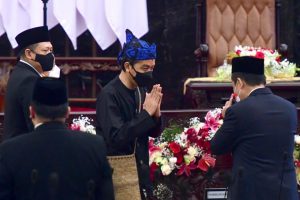Indonesia’s President Joko Widodo has pledged to push ahead with his plans to reform the economy, in spite of the heavy burden that COVID-19 has imposed on the country since the start of the pandemic
In a national address marking the country’s 76th anniversary of independence yesterday, the leader, often known as Jokowi, acknowledged the economic burden imposed by the virus, but said that “it must not hinder the process of structural reforms of our economy.”
“Amid today’s disruptive world, the spirit to change, the spirit to make changes and the spirit to innovate have become the foundation to build an advanced Indonesia,” Jokowi said in his speech. “With the COVID-19 pandemic, the acceleration of innovation has become an integrated part of our everyday lives.”
Since May, Indonesia has been hit hard by the Delta variant of COVID-19. At its peak last month, the country was recording 50,000 new cases per day, more than five times the figures in June, and sick people overwhelmed hospitals or died at home or while awaiting treatment. The country has now recorded a total of 3.8 million cases and 118,833 fatalities, although these are widely considered severe undercounts due to the country’s limited testing and contact tracing measures.
The deadly impact of the virus has had its inevitable economic component. Last year, Indonesia’s economy contracted for the first time since the Asian financial crash of 1997-98, and while the country recorded a 7 percent rebound in the second quarter of this year, new restrictions are likely to once again depress growth.
In this context, Jokowi said that his agenda remained focused on structural reforms designed “to promote inclusive and sustainable economic development.” Repeating the promises made at the beginning of his second term, he added that development of “quality human capital” and infrastructure development will remain priorities, the latter a hallmark of his seven years in power.
The Indonesian leader also expressed his hope that reform could help Indonesia initiate a transition toward a more sustainable economy. “Transformation toward new and renewable energy as well as the acceleration of an economy based on green technology will be an important change in our economy,” he said.
Those are all rosy ways of describing the contentious job creation law that was passed by parliament last October, which aims to attract investment by slashing back the country’s onerous regulations and red tape.
The 905-page law, known as the Omnibus Bill, includes sweeping revisions to 79 laws in key sectors including labor and taxation, which Jokowi’s administration claims are necessary to spur economic growth and position Indonesia at an axial position in vital global supply chains.
But the law has been widely condemned for its likely impacts on labor rights and environmental protections. In particular, unions say that the laws will harm workers who have already been squeezed by the impacts of COVID-19, pointing to provisions that will allow employers to cut mandatory leave and reduce severance pay.
The speech also had a slightly defensive tone that reflected not just the criticisms of Jokowi’s economic reform agenda, but also reflects the pressure that his government has come under for its handling of the pandemic.
In its earliest months, the Indonesian government was slow to take COVID-19 seriously. Then, wary of the economic impacts, Jokowi resisted calls for a lockdown to contain the virus, banking instead on using vaccines as a ladder out of the pandemic, setting ambitious plans to distribute 181.5 million doses by the end of this year.
But while Indonesia began vaccinating earlier than many other countries in Southeast Asia, limited supplies and logistical challenges have hampered the rollout. As of August 15, Indonesian health authorities had only fully vaccinated just over 28 million people, while a further 25.5 million had received at least one dose, according to Our World in Data.
In his speech, Jokowi acknowledged that the COVID-19 pandemic “has brought with it exhaustion, boredom, weariness, sadness, and distress,” and promised to improve the government’s vaccination and treatment efforts. “I also understand that there are many criticisms directed at the government,” he added. “Constructive criticism is crucial and we always respond to that by fulfilling our responsibilities as expected by the people.”
While Indonesia has now passed its Delta peak, the country remains far from widespread with regard to vaccine coverage necessary to allow a full reopening of the economy. Even as cases on densely populated Java and Bali are falling, they are rising in Indonesia’s outer islands. Along with the potentially disruptive effects of Jokowi’s structural reform program, this suggests that Indonesia’s leader isn’t quite out of the political woods yet.

































